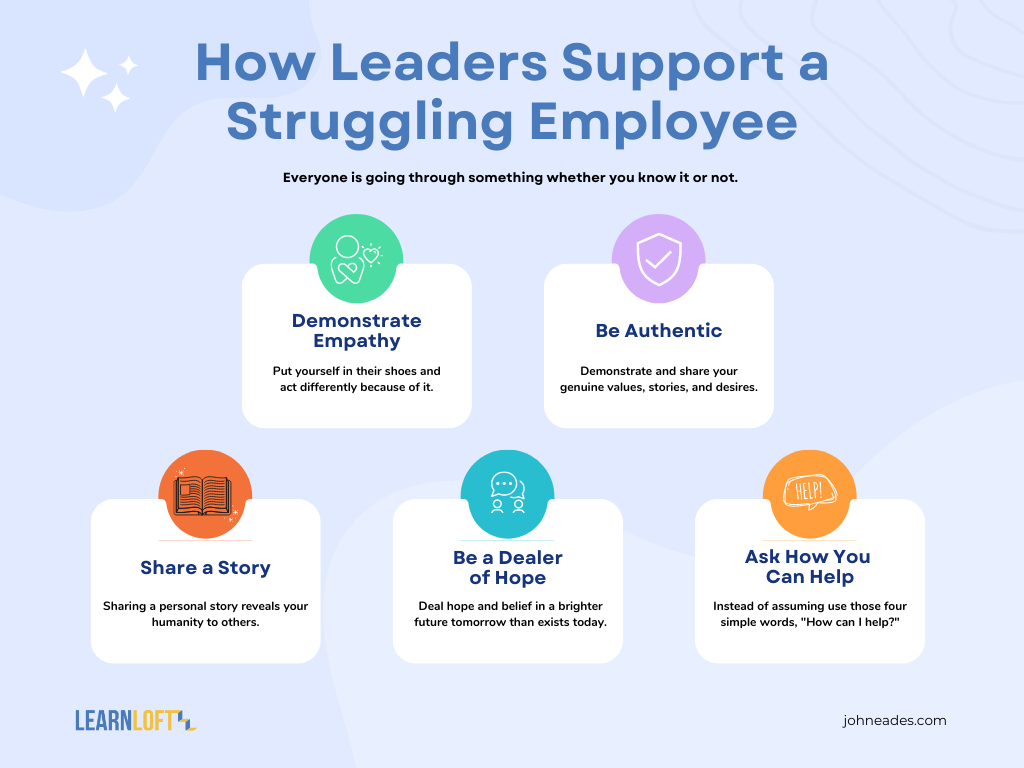Comments
- No comments found

Everyone is going through something, whether you know it or not.
Literally, everyone from the CEO to a part-time employee in your organization has something going on in their personal or professional life—challenges like a cancer diagnosis, an only child going off to college, or a pet passing away. Regardless of the severity, something is going on, and it's likely you don't know about it as a leader.
Take Joe, a sales manager at a software company, as an example. During a recent leadership coaching conversation, he shared a struggle with one of his highest and most experienced salespeople, who was demonstrating some out-of-character behavior. Her effort, curiosity, and passion that Joe had previously seen from her had all but vanished, and her lack of sales results wasn't hard to miss.
Instead of continuing to assume or guess what was going on, Joe agreed to find out by asking her a simple question: "I have noticed some out-of-character behavior, and it has me concerned about you both personally and professionally. Is everything alright on a human level?"
Her response blew him away: "Joe, thank you for asking. I have had a lot going on in my personal life, which I would prefer not to go into. However, I have been unfocused in my work. I am sorry. Please be patient with me, I will get back on track."
Not only did her response teach Joe and me a valuable lesson, but it's also an important lesson the immortal Ted Lasso shared, often attributed to Walt Whitman, for all leaders to remember.
Be curious, not judgmental.
It would have been easy to pass judgment or put her on some sort of Performance Improvement Plan (PIP), but being a human leader won the day.
When there is something going on in someone's personal or professional life, it's not a leader's job to solve the problem or release the pressure for them. While there could be things you can do to help, a listening and non-judgmental ear from someone they respect might mean more than anything you do.
A leader's job isn't to solve every problem.
Depending on the severity of the personal or professional issue, it might seem overwhelming and unrecoverable for one reason or another. It's in times like this that one must remember the wisdom of Christine Cain and the difference between being planted and buried.
Sometimes when you are in a dark place, you think you have been buried, but really you have been planted. - Christine Cain
As correct as Cain is, you probably also want tactical strategies to help employees going through difficult times effectively. Here are some proven steps to help you.

While many skills are essential in this new leadership era, empathy is one standing above the rest. Now before you shake empathy off as a weak skill, let's get clear on what it is in the context of leadership. I have come to define it as, "How well you identify with others to understand their feelings and perceptions in order to guide your actions." I describe it in the Accelerate Leadership Program as your ability to put yourself in someone else's shoes and act differently because of it.
While the definition provides clarity, the reason it's such a critical leadership skill is that the one thing that every professional wants is to be understood, especially by their boss.
Empathy is a critical leadership skill because people want to be understood, especially by their boss.
Do your best to put yourself in their shoes and act differently because of it. While this can be challenging, it's more important than ever.
The word authentic, when used in the context of leadership, means "how a leader demonstrates and shares their genuine values, stories, and desires." If the definition wasn't clear enough, I want you to remember this leadership truth about authenticity:
Authentic leaders forge strong relationships and inspire others to bring their human self to work.
To take it a step further, too many leaders are trying to be something or someone they aren't, and their team knows it.
There is a long list of things you can do to help a team member during difficult times, but sharing a personal story or lesson is at the top of the list. When leaders share their personal stories and struggles, it reveals their humanity to others. It fosters trust and makes leaders relatable.
If a team member is willing to share what's going on in their life, handle it with care. Use a personal story or an example of another person who leveraged others to help them get through
The reality of a situation isn’t always what we want to hear or experience. This is why the best leaders deal with hope and belief in a brighter future tomorrow than exists today.
Leaders are dealers of hope and belief.
Napoleon famously said, “a leader’s role is to define reality, then give hope.” The longer I have studied great leaders, the more I recognize that they are constantly looking for opportunities to transfer hope and belief.
Just because it’s simple, doesn’t mean it’s easy. Instead of assuming you know what to do and when to do it to help them, simply ask, “How can I help?”
While they might not know immediately, at least you have put a bug in their ear that you are an advocate for them and someone that is there to help, not hurt. This is critical because no one gets through hard times alone.
No one gets through hard times alone.
Just arm yourself with those four simple words, “How can I help?”
John is the CEO of LearnLoft, author of, F.M.L. Standing Out & Being a Leader and host of the 'Follow My Lead' Podcast. He writes or has been featured on Inc.com, LinkedIn Pulse, TrainingIndustry.com, eLearningIndustry.com, CNBC Money, and more. John completed his education at the University of Maryland College.
Leave your comments
Post comment as a guest